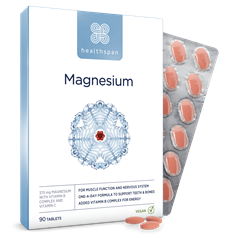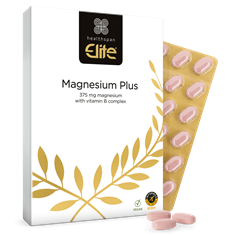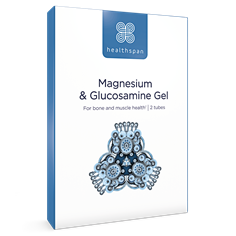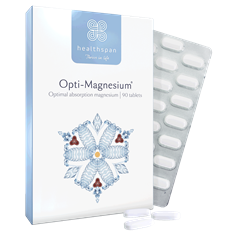Magnesium Supplements
Magnesium is one of our body's most important minerals, playing a crucial role in almost every metabolic reaction and supporting bone health and energy production. It also has a role to play in the normal functioning of the nervous system.
To support dietary intake (which studies have shown is often insufficient), magnesium supplements are popular – either as magnesium tablets, topical gels, or creams. Some brands offer a magnesium gummy, although these are rare. There are also different types of magnesium to consider, including magnesium citrate tablets and magnesium glycinate.
Healthspan customer reviews
Magnesium guides




What is magnesium?
Magnesium is a mineral that's vital for our body to work: in fact, few enzymes (which are crucial to the body's chemical reactions) work without it. Magnesium is used in functions such as the production of energy, protein, and genetic material.
Magnesium is also known to support bone and dental health, with more than 70 per cent of the body's magnesium stores found in the bones and teeth.
Researchers have also discovered that magnesium plays an important role in maintaining the action of the 'pumps' that live on cell membranes and allow electrical messages to be passed between cells. This is particularly important for controlling calcium entry into the cells of the heart, to trigger a regular heartbeat.
Magnesium must be obtained through the diet, with food sources ranging from seafood, meat, and eggs, to wholegrains and green leafy vegetables. However, during processing, foods can lose up to 80 per of their magnesium content, and more will be lost during storage and cooking. As a result, magnesium deficiency is thought to be common.
If you're unsure if you are getting enough magnesium, the nutrient reference value (NRV: the level considered adequate to meet the nutritional requirements of an average, healthy adult to prevent deficiency) is 375mg – although people who are physically active, or sweat large amounts of salt, may need more. Intakes of up to 400mg per day would not be expected to cause adverse effects.
To read more about nutrition reference intakes, read nutritionist Sarah Dumont-Gale's guide.
What is magnesium good for?
As mentioned earlier, magnesium is hugely important to our health.
As well as being the fourth most abundant mineral in the body, it is the second most abundant in the cells, after potassium. One of the vital roles it plays is controlling the 'pumps' that move salts in and out of the cells.
It's also essential for muscle contraction and the normal functioning of the nervous system, including neurotransmission and contraction of the heart muscle. Read more about the benefits of magnesium, including key research insights around heart health.
Benefits of magnesium
The benefits of magnesium can be loosely grouped into four categories:
- Energy production. Magnesium is essential for more than 700 reactions within the body, many of which involve the production of energy from fatty acids and glucose.
- Salt balance. Magnesium helps to facilitate the movement of electrolytes (such as sodium and potassium) in and out of cells, which is vital for normal cell function, muscle contraction and nerve conduction.
- Body maintenance. Our cells divide and replace themselves regularly to maintain healthy bones and tissues throughout our body. Magnesium plays an important role in cell division and contributes to normal protein synthesis, cell division, and muscle function, as well as the maintenance of normal bones and teeth.
- Mental health. Magnesium contributes to normal functioning of the nervous system and normal psychological function.
Read more about the benefits of magnesium in this comprehensive nutrient guide.
Types of magnesium supplements
Magnesium supplements are available in different forms, including magnesium chloride, magnesium glycinate and magnesium oxide. These have different benefits, and can also be combined with other vitamins and minerals depending on your health goals.
For example, magnesium is commonly combined with calcium and vitamin D in bone health supplements, or with B vitamins to help boost energy and reduce fatigue.
Some supplements – including Healthspan's premium magnesium supplement, Opti-Magnesium® – contain a blend of magnesium salts to provide the maximum benefit.
Magnesium glycinate
Formed from magnesium and the amino acid glycine (which your body uses for protein construction), magnesium glycinate occurs naturally in many protein-rich foods, including meat, fish, dairy, and legumes.
However, because of this widespread availability, the risk of an overdose of magnesium glycinate through supplementation can be higher than when obtained naturally through the diet. High amounts can also negatively affect the functioning of the immune system, potentially leaving you more vulnerable to illness.
Some people have also reported magnesium and glycine leading to gastrointestinal distress, including stomach cramps and nausea.
Magnesium citrate
Magnesium citrate (magnesium bound with citric acid, which is found naturally in citrus fruits) is another optimally absorbed form of magnesium, but because the citrate part is relatively heavy, it provides a lower amount of magnesium per gram.
This means that magnesium citrate treads a safe and effective balance in terms of overall magnesium intake.
Opti-Magnesium®, Healthspan's premium magnesium supplement, combines two magnesium salts – magnesium citrate and magnesium malate (both highly absorbable sources) for optimum benefit.
The supplement also contains Vitamin D3 to help the absorption of calcium in the body, which alongside magnesium plays a key role in the health of bones and teeth. Vitamin D3 also supports muscle function and the immune system.
Magnesium chloride
Magnesium chloride is another popular form. It's well absorbed by the body, and can be found in topical formulations such as Healthspan's Glucosamine and Magnesium Gel, which sinks into the skin quickly and easily.
Together with glucosamine, a natural substance found in the connective tissue of our joints, this supplement gel contains a blend of other natural ingredients – including capsicum from chilli peppers, cooling eucalyptus oil, and pure oil of wintergreen for its soothing effects.
Magnesium oxide
One of the most popular and cost-effective forms of magnesium tablets is magnesium oxide – a salt that combines magnesium and oxygen.
It's less easily absorbed than some other magnesium salts, but provides a high amount of magnesium per gram (600mg per 1g of magnesium oxide), making it an excellent-value option. As a result, magnesium oxide is the key ingredient in two of Healthspan's magnesium supplements:
Magnesium 375mg contains magnesium oxide and magnesium stearate to support muscle and nerve function, as well as heathy teeth and bones. B vitamins have been added to help reduce tiredness and fatigue, alongside vitamin C to support immune health. It's a great-value option, at just 9p per one-a-day tablet.
Elite Magnesium Plus also provides a dual source of magnesium – magnesium oxide and magnesium stearate – to provide a high dose of magnesium while avoiding digestive upsets. Every tablet also contains the full family of B vitamins, for only 10p per daily dose. The product has undergone rigorous testing for substances banned for competing athletes, and is approved by Informed Sport.
Do you need to take magnesium supplements?
Magnesium may be present in a number of foods, but according to the National Diet and Nutrition Surveys, almost 13% of adults aged 19-46 years obtain less than the lower reference nutrient intake (LRNI). This rises to 25% in adults aged 75 and over.
Average intakes within the UK are around 323mg for men and 228mg for women. Researchers have also found that women with osteoporosis have significantly lower magnesium levels than similar women without the condition.
In combination, these statistics suggest that many of us could benefit from a magnesium supplement – particularly in the presence of symptoms like loss of appetite, nausea, fatigue, and insomnia (which can indicate mild deficiency), or muscle cramps, numbness and tingling, confusion, and nervousness, which can result from severe deficiency.
However, many of these symptoms can also be a sign of something more serious, so always consult with your GP.
If symptoms are due to a magnesium deficiency, supplements are best taken with food to optimise absorption. Magnesium absorption is also decreased by excess dietary fat, salt, alcohol, phosphoric acid (found in canned fizzy drinks) and coffee.
If you're still not sure which is the best magnesium supplement for you, please feel free to get in touch for more help or advice. Our fully trained advisors are available seven days a week from our UK-based call centre.
Explore the full range of Healthspan vitamins and supplements.












